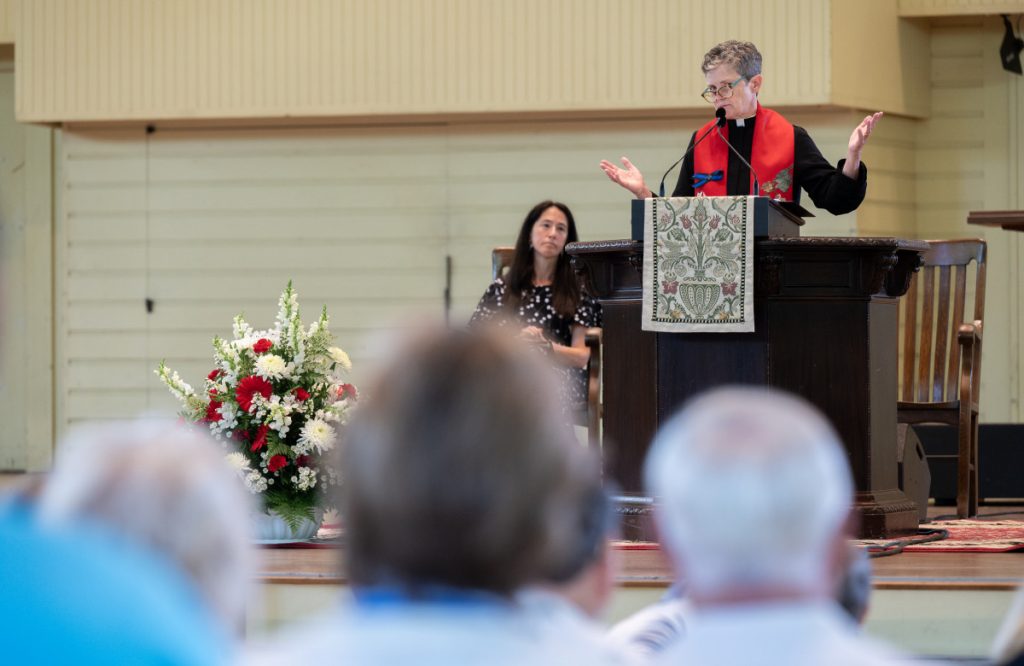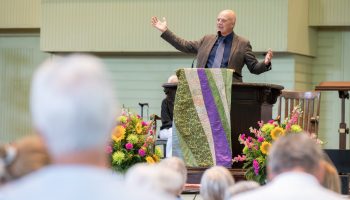
The Rev. Kate Braestrup, chaplain to the Maine Warden Service, opens her Week Five sermon series Sunday morning in the Amphitheater.
How you practice is how you play.
The writer of the letter to the Hebrews warned their readers that they were not mature enough for solid food. They had become “sluggish in hearing” and should have been teachers of the Word, but they needed someone to do some basic teaching with them about the “oracles of God.”
They still needed milk because they were “unskilled in the words of righteousness.” Solid food is for people mature in the faith, “whose faculties have been trained to distinguish good from evil.”
The Rev. Kate Braestrup said, “I am not sure I am ready for solid food. But the way we practice, physically, psychically and spiritually, is the way we play.”
She preached at the 9:15 a.m. Thursday morning worship service in the Amphitheater. Her sermon title was “How You Practice is How You Play,” and the scripture reading was Hebrews 5: 11-14.
Braestrup attends the firearms training for “baby game wardens.” Most of these new game wardens have been hunting and fishing all their lives or have been in the military. They know how to shoot guns, but this training is to learn how to use, if necessary, deadly force.
The students line up in a row, facing targets down range on a sandy berm. When the instructor calls “threat,” they take a step forward. When the instructor calls “gun,” they point their weapons and fire until the weapon is empty.
“I was there and when the instructor said ‘threat,’ I could feel my body leap out in front of the students with my arms out at my side (to protect the target),” Braestrup said. “When I told the instructor about it he said, ‘Don’t do that!’ It is hard to train yourself out of instinct.”
How you practice is how you play.
She noted that there was a time when people were trained wrong. She told a story of three FBI agents, in a shootout, who all died. In the investigation afterward, the investigators found the agents’ pockets full of used bullet casings, called brass.
“On the training range, these agents were taught to empty their guns and then to pick up the brass. They stopped to pick up the casings in the middle of a shootout. That was probably not super useful,” Braestrup said. Now, she said, the brass is left on the ground until well after the training session.
How you practice is how you play.
In his book, From Here to There: The Art and Science of Finding and Losing Our Way, author Michael Bond wrote about the science of human navigation. The book includes a story about the Maine Wardens efforts to find Gerry Largay, a 66-year old woman, an Appalachian Trail through hiker, who got lost in the woods. Her body was not found until a forest surveyor stumbled upon it months later.
“It was a horrible ordeal for the family and a failure for the searchers that still hurts,” Braestrup said.
A search and rescue team spends a lot of time with the family to learn as much as they can about the person that might give them clues about their behavior when they are lost. These interactions with the family can build lasting relationships.
“They fall in love with the subjects of the search, and they work harder to find them,” Braestrup said. “It breaks their hearts when they fail.”
She continued, “We can be perfectly sane and rational, but if we are lost in the woods — even professionals — as soon as we realize we are lost, we have the urge to run. Our ancestors had to fight because danger was a real and constant threat. Nature has put it in us not to trust our ability to solve this danger by ourselves.”
Braestrup called this “preloaded behavior” and it may or may not be helpful. “When we are under stress, we default to our training. Our instinct is to run from danger, but first responders are trained to go toward the danger.”
Gerry had some hiking training, to basically leave no trace, to wear earth-toned clothing, manage your organic waste and not leave trash on the trail. Gerry was burying her organic waste and started a fire, but quickly put it out. Gerry defaulted to her training and instead of leaving a trail behind her, she died.
“I would leave a trail of pink panties, a dead cell phone, and light a huge fire,” Braestrup said. “We think that any smart person, when lost, would leave a trail, but that is not how our minds work under stress. We default to our training.”
How we practice is how we play.
She cited Rabbi Sharon Brous, who in her Interfaith Lecture on Wednesday, talked about building “muscle memory” through spiritual practices. Some religious ideals can be helpful when the chips are down, Braestrup noted, some not.
A police officer in the Pacific Northwest told Braestrup that in 2016 he noticed a change in the children in the neighborhood he was patrolling. They used to wave or walk over and talk to him. Now they were running away or cursing at him.
The officer wondered, when the next earthquake happened, would the children know who to run to and who would make the difference between life and death for them?. “Do their parents tell them police are untrustworthy except in tsunamis, earthquakes and fires?” he wondered.
“The children will go on instinct or default to their training,” Braestrup said. “How do we train our children and each other? We are always practicing, but we are not necessarily right. Will we be adaptive or life-saving when we don’t have time to think?”
How you practice is how you play.
She closed with a prayer. “O God, I know you are always seeking me, calling to me. May I not be found too late, the signal fire unlit, my pockets full of brass, my heart bound up in folly. May my practice, today and every day, encode the memory in muscle, not just mind, so my faculties are trained to distinguish good from evil. Train me, Lord, to run to you.”
Melissa Spas, vice president for religion at Chautauqua, presided. Stephine Hunt, manager of literary arts at Chautauqua, read the scripture. “Pastoral in A Minor,” by James H.”Jim” Johnson, a member of the Motet and Chautauqua choirs, had its world premiere as the prelude for the day. It was played by Motet Consort members Barbara Hois, flute, and Joseph Musser, piano. The Motet Choir sang “Grow in Grace,” by Malcolm Archer. The choir was under the direction of Joshua Stafford, director of sacred music and the Jared Jacobsen Chair for the Organist, and accompanied by Rees Roberts, 2024 organ scholar, on the Massey Memorial Organ. Stafford on piano and Roberts on the organ led a rousing rendition of the closing hymn, “I love to tell the story.” For the postlude, Roberts played “Sortie in B-flat Major,” by Guy Ropartz. This week’s services and chaplaincy are supported by the Jackson-Carnahan Memorial Chaplaincy and the John William Tyrrell Endowment for Religion.




